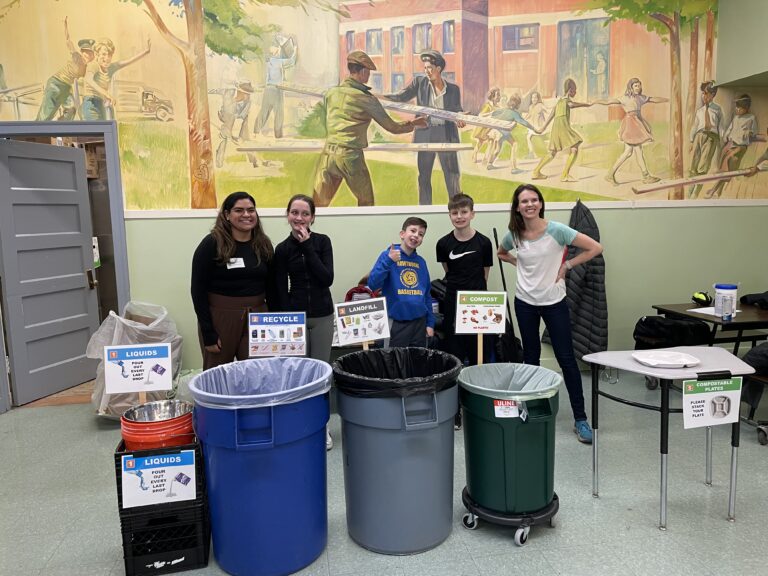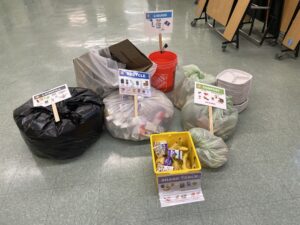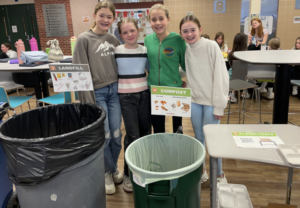
If January is any indication, this will be a good year for making schools more sustainable. Our Zero Waste Schools (ZWS) program had not one but two launches in January. The ZWS team was at Hawthorne Scholastic Academy and Deer Path Middle School to help reduce cafeteria and kitchen waste and get processes in place to ensure these schools can easily recycle and compost. Increasingly, ZWS is prioritizing prevention over waste diversion. The best way to reduce waste is to not create it in the first place.
On Wednesday, January 10th, the ZWS team helped launch Hawthorne Scholastic Academy, a K-8 school in Chicago Public Schools. Their initial zero waste launch included third through eighth grades, and they recently successfully launched kindergarten through second grade. Seven Generations Ahead’s (SGA) Becky Brodsky says collaboration was key to their success. The lunch room staff, teachers, parent and student volunteers were all excited about the launch and eager to help.
“It was a team effort,” she said. “They spent a lot of time thinking about the setup and the flow and making the sorting line as efficient as possible.”
 And it certainly worked, as the waste audit showed on launch day. The majority of their waste, 34 pounds, went into compost. The share table accounted for an additional 12 pounds of food, and 13 pounds went into recycling. In a true testament to the success of the launch, only seven pounds of waste went into the landfill. That amounted to just half a bag of garbage over four lunch periods!
And it certainly worked, as the waste audit showed on launch day. The majority of their waste, 34 pounds, went into compost. The share table accounted for an additional 12 pounds of food, and 13 pounds went into recycling. In a true testament to the success of the launch, only seven pounds of waste went into the landfill. That amounted to just half a bag of garbage over four lunch periods!
Brodsky shared that they were well-prepared for launch day. “They had the bins ready and printed the signs themselves. It went really smoothly because they were ready to go.”
Just a couple weeks later the ZWS team was back at it for the launch of Deer Path Middle School in Lake Forest on January 23rd. Brodsky says their launch happened in large part due to the hard work, persistence, and collaboration of a number of folks, including very dedicated teachers who co-chair the school’s Green Team, administrators, custodial staff, and students. The students included many eighth graders who were eager to see the program launch before they graduated.
Brodsky said the school already had some waste reduction measures in place, but the ZWS team was able to help them refine their recycling procedures and add commercial composting. The Village of Lake Forest had started a partnership with WasteNot Compost for their curbside composting program, which made it easier for the school to partner with them. And since families can now compost at home, students will be able to bring home what they learn at school and encourage their families to sign up.
The majority of Deer Path’s waste on launch day was either compost or recycling, 85 pounds and 55 pounds, respectively. The rest was either liquid waste or landfill. With the new ZWS procedures in place, they were able to reduce lunchroom waste from 12.5 bags of garbage a day to just two!

Brodsky noted that the students at Deer Path were especially excited for the launch. One of the seventh grade volunteers told her, “I’m so excited we’re finally doing this! We’ve been waiting so long.”
As the ZWS team continues to launch more schools this year, it is increasingly focused not just on waste diversion, but also on waste prevention measures, such as bulk napkin and condiment dispensers and reusable silverware. These initiatives involve looking upstream at where waste is coming from and finding creative ways to prevent it. Eliminating waste at the source not only saves resources, it can also save time and money, making it a triple win for schools!
Stay tuned for more updates on SGA’s work helping schools get on the path to zero waste.
